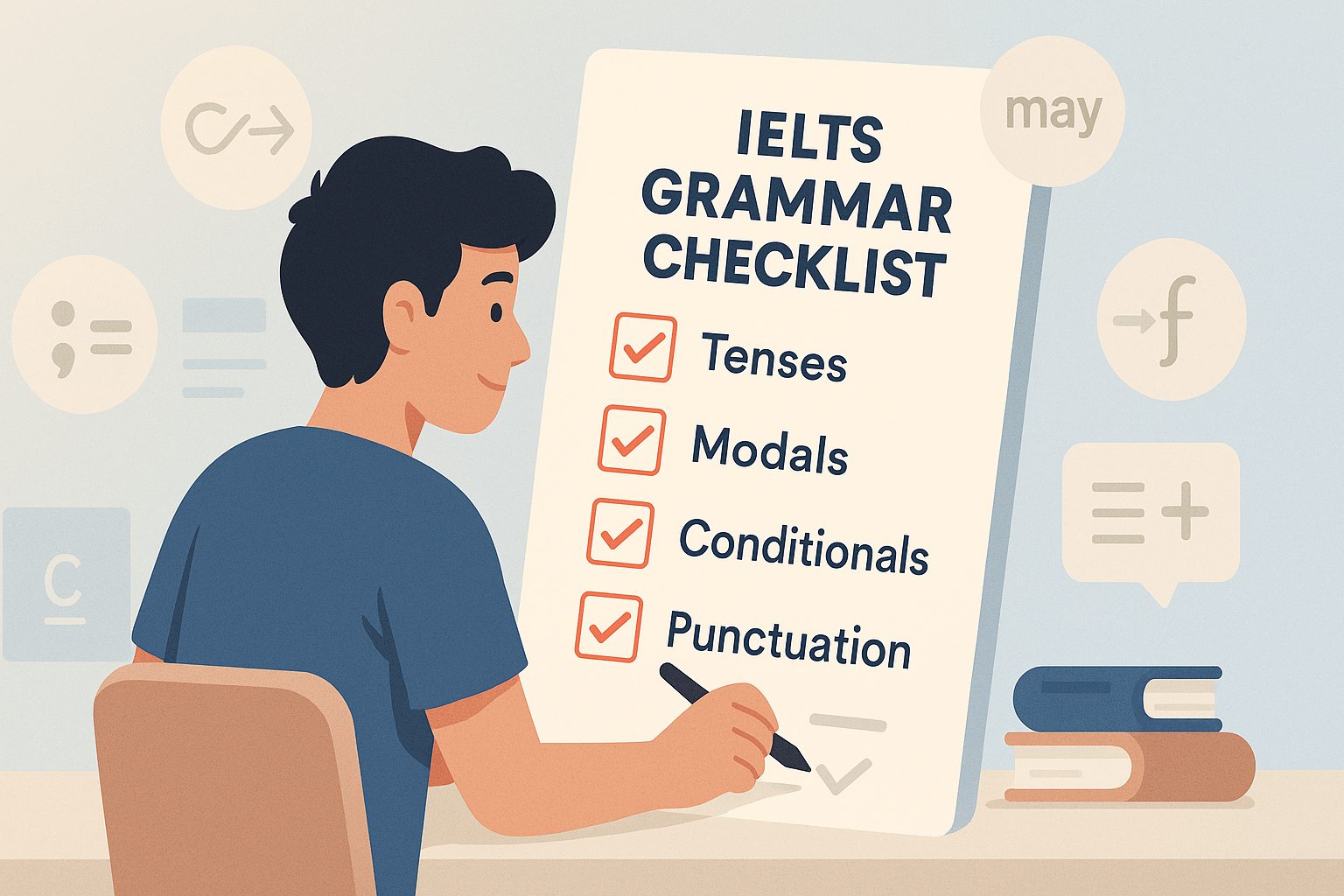One of the easiest ways to make your IELTS Writing Task 2 essays sound academic and examiner-friendly is to use modals and hedging language correctly.
When my students ask, “Why do my essays sound too direct or informal?” my answer is simple:
“You need to hedge your statements and use modal verbs to create a formal, balanced tone.”
In this guide, I’ll teach you:
- ✅ What IELTS modals are and why they matter
- ✅ How to use may, might, could, and should for academic tone
- ✅ How hedging improves your band score
- ✅ Common mistakes and corrections
If you want a full overview of grammar for Band 7–9, check my IELTS Writing Task 2 Grammar for Band 7–9. This pillar post covers sentence variety, tenses, and advanced structures you should master before exam day.
What Are IELTS Modals and Why Are They Important?
Modals are auxiliary verbs that express possibility, probability, necessity, or obligation.
In IELTS Writing Task 2, they help you:
- ✅ Sound formal and objective
- ✅ Avoid overgeneralizing
- ✅ Show analytical thinking
According to the official IELTS band descriptors:
- Grammatical Range and Accuracy (25%) rewards the correct and varied use of structures like modals.
- Overly absolute or casual language can make essays seem less academic.
For official guidance, see:
Common IELTS Modals and Their Academic Uses
Here are the most useful IELTS modals for Writing Task 2 and how to use them to hedge and formalize your essay.
1. May – Expressing Possibility
Use may to suggest something could happen, without sounding too certain.
Example:
“Introducing stricter traffic laws may reduce urban congestion.”
- ✅ Shows possibility without certainty
- ✅ Keeps tone academic and cautious
2. Might – Showing Lower Probability
Use might to show a weaker possibility than “may.”
Example:
“Increasing public awareness campaigns might encourage healthier eating habits.”
- ✅ Perfect for discussions and predictions
- ✅ Avoids overstating your claim
3. Could – Indicating Potential Consequences
Use could to highlight a potential result or effect.
Example:
“Investing in renewable energy could significantly reduce carbon emissions.”
- ✅ Excellent for problem/solution and cause/effect essays
- ✅ Suggests logical but not guaranteed outcomes
4. Should – Giving Recommendations Politely
Use should when recommending actions without sounding forceful.
Example:
“Governments should prioritize education funding to reduce inequality.”
- ✅ Sounds advisory, not commanding
- ✅ Fits solution and opinion essays
What Is Hedging and Why It Matters in IELTS Writing
Hedging is the practice of softening your statements to make them less absolute and more academic.
In IELTS Writing Task 2, it helps you:
- ✅ Avoid sounding biased or emotional
- ✅ Demonstrate critical and analytical thinking
- ✅ Protect your argument when discussing controversial topics
Examples of hedging in academic writing:
| Absolute Statement | Hedged Academic Statement |
|---|---|
| “Online learning is better than schools.” | “Online learning may be more convenient for some learners.” |
| “Tax increases will stop pollution.” | “Tax increases could help reduce pollution levels.” |
Sample Band 9 Paragraph Using IELTS Modals and Hedging
“Rapid urbanization could lead to increased traffic congestion and pollution. To address this issue, city authorities should expand public transportation systems and promote cycling. Such measures may encourage citizens to adopt greener lifestyles, which might gradually improve overall air quality.”
Why this works:
- ✅ Uses four modals naturally: could, should, may, might
- ✅ Demonstrates academic caution and balance
- ✅ Fits Band 8–9 grammatical range requirements
Common Mistakes to Avoid
Even strong students lose marks when misusing modals and hedging:
- Overusing modals in every sentence
- ❌ “Governments should ban cars. People should use bikes. Cities should improve air.”
- ✅ Mix modals with varied sentence structures.
- Being too absolute or casual
- ❌ “This will definitely solve the problem.”
- ✅ “This may help solve the problem.”
- Using informal expressions for hedging
- ❌ “Kind of, maybe, sort of”
- ✅ Use formal hedging with may, might, could, appear to, likely to.
Quick Practice Exercise
Rewrite the following sentences using IELTS modals and hedging:
- “Technology makes people lazy.”
- ✅ “Technology may make some people less active.”
- “Plastic bans will end pollution.”
- ✅ “Plastic bans could help reduce pollution levels.”
FAQ Section
Q1: How do IELTS modals improve my Writing Task 2 score?
They show grammatical range and help you write formal, hedged sentences, which examiners expect at Band 7–9.
Q2: Which modals are best for IELTS academic writing?
Use may, might, could, should, must, and can for formal recommendations, predictions, and cause/effect relationships.
Q3: Is hedging necessary in IELTS Writing Task 2?
Yes. Hedging makes your essay sound academic and balanced, reducing the risk of overgeneralization.
Conclusion
Using IELTS modals and hedging is a powerful technique to make your Writing Task 2 essays sound academic and examiner-friendly.
When you:
- ✅ Use may, might, could, and should naturally
- ✅ Hedge statements to avoid absolute claims
- ✅ Combine modals with varied grammar and clear arguments
… you’re well on your way to Band 7–9 writing.
🔗 Next step: Combine modals with complex sentences and conditional structures from our IELTS Writing Task 2 Grammar for Band 7–9 to create polished, high-scoring essays.






One Response
What i do not realize is in fact how you are no longer actually much more wellfavored than you might be right now Youre very intelligent You recognize thus considerably in relation to this topic made me in my view believe it from numerous numerous angles Its like men and women are not fascinated until it is one thing to do with Lady gaga Your own stuffs excellent All the time handle it up